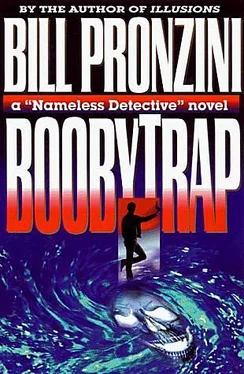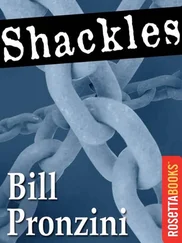Risk it? I took another look at number two’s windows; the curtains on both seemed tight-pulled, no edges peeled back, and there was nobody outside. Have to do it, I thought. Everything Dixon or I did tonight involved risk, and this was as minimal as any was likely to be.
I cased the binoculars, wrapped the straps around the case, held it in tight against my left side as I left the cover of the trees. Out in the open, the sea wind was icy and buffeting; its salt-and-kelp smell burned in my nostrils. Walk, steady plodding pace — you’re somebody local, somebody who belongs. Don’t look at the houses. Straight to the back side of the projection… okay.
I was breathing hard, as if I’d just run a long distance. I took several deep, slow breaths before I got down on all fours and crawled up over stubbly grass and sharp juts of rock to just below the rim. Then I uncased the glasses again and eased up the rest of the way on my belly, keeping my head as low to the ground as I could, until I had vision of the houses.
Maybe I could be seen lying up there and maybe I couldn’t; it was hard to gauge. Daylight was fading and the light quality was growing poor. Point in my favor, point against me. Get it done fast. I leaned up slightly on my forearms, fitted the glasses to my eyes, got them focused, located a mailbox. On its front was a black-painted number; I could just make it out.
850
The second house, one of the lighted ones, was Latimer’s.
He was here. And if Chuck was still alive, he was here, too.
I slithered back below the rim, repacked the binoculars. There was sweat all over me, but the chill wind had dried most of it by the time I was on my feet and moving back — slow and steady — to the trees, hiding the case against my right side this time. When I reached the grove I quickened my pace as much as I dared; thickening shadows made the footing uncertain in there.
Inside the car, I picked up the phone receiver and said Dixon’s name.
“No, it’s Marian.” Her voice was thin, stringy from the pressure. “Pat’s gone.”
“Latimer called?”
“A minute or two after Pat talked to you.”
“How long ago was that? I’m not tracking time too well.”
“About twenty minutes. You were right — he’s on his way to the coast.”
“Half Moon Bay?”
“Princeton. A service station.”
“You’re sure Latimer sent him to Princeton?”
“That’s what Pat said.”
“To wait at this service station for another call?”
“Yes. Where are you?”
“Not too far from there.”
“Latimer? Is he—?”
“I’m pretty sure he’s here.”
Pause. Then, “What are you and Pat going to do?”
“Not sure yet. We’ll work something out.”
“Be careful. Please.”
“You know we will. Stay by the phone.”
“What else can I do.”
“If you’re religious, you might pray a little.”
“I’ve done nothing but since Pat left.”
I broke the connection, punched out Dixon’s cell phone number. He answered by saying, “Man, what took you so long?”
“I had to do some maneuvering to get an angle on the houses.”
“Did you pinpoint Latimer’s? Is he there?”
“Looks like it. It’s one of the lighted ones.”
“Thank God. Marian tell you he’s sending me to a Chevron station in Princeton?”
“She told me. Keep you dangling a while longer — and he doesn’t want you knowing his address too far in advance.”
“That’s what I figured, too. Sly son of a bitch.”
“How much time did he give you to get to Princeton?”
“An hour. He’ll call the station at nine exactly.”
“Tight schedule, but you should make it all right.”
“Tell me where you are,” he said.
“Road a couple of miles south of Half Moon Bay. No more than fifteen minutes from Princeton.”
“Suppose I come straight there instead? I can get to you before nine—”
“No. If you’re not at the station when he calls—”
“He’ll just think I got hung up in traffic.”
“More likely it’d make him suspicious. Do what he told you to — straight to the Chevron station, take his call.”
No response.
“Pat? You know I’m right.”
“… Yeah. Okay. You going to tell me the name of the road now?”
“Let Latimer do that. Follow his lead all the way.”
I thought Dixon might argue, but he didn’t. He said, “When I do get there, how’re we going to work it?”
“Couple of ideas, but they need more thought.” I didn’t add that neither had much appeal. Damn tricky to pull off, either of them, and no way I could see yet to minimize the danger.
“I’ve got a couple myself,” he said. “Thresh ‘em out now?”
“No, it’s too soon. You work on yours, I’ll work on mine. Call me as soon as you hear from Latimer and we’ll start setting something up then.”
“Right.”
I sat fidgeting, trying to refine one or the other plan to the point where it seemed viable enough to put into operation. Outside, the shadows got longer, the overcast sky duskier. Past the fenced pumpkin field across the road, I could see part of the ocean and part of the horizon and daylight still showed out there. But it would be gone in another twenty minutes or so, full dark in not much more than half an hour. Full dark by the time Dixon arrived.
Advantage in that, and in favor of the best — by a hair — of my two ideas, which was for me to get into the trunk of Pat’s car with my gun out and ready and the trunk lid closed but not latched. Chances were Latimer wouldn’t think to search the car, but if he did, I could nail him then and there. If he let Dixon walk straight into the house, I’d wait a couple of minutes, then slip out and find a way to get inside myself and take Latimer by surprise. It might work, but there were any number of things that could go wrong with it, too many ifs and too many variables. The main variable was Latimer himself.
What did he have in mind for Dixon? Another boobytrap bomb? Not if he continued to wait in the house for Pat to arrive; he wouldn’t risk blowing himself up. Bombs were not only his MO but a central part of his psychological makeup — yet as much as he seemed to hate Dixon, and as frustrated as he had to be after what had happened at Deep Mountain Lake, he might be looking for a face-to-face finish with a gun or some other weapon. And what about Chuck? If the boy was even still alive…
The more I worked my brain, the more uneasy I grew. It was as if my thoughts were on a loop: they kept coming back to Latimer and his mania for explosive devices. But that was not the only thing bothering me about this setup.
Why Princeton?
Princeton was a seaside hamlet five miles or so north of Half Moon Bay. Why send Dixon there instead of to Half Moon Bay proper, a service station closer to Bluffside Drive? That would accomplish the same purpose, wouldn’t it?
Or would it?
Fifteen minutes, instead of five or ten. Was there any reason for him to need an extra five or ten minutes?
Suppose…
Christ!
I jerked my watch up close to my eyes; the luminous hands read 8:48. I got the phone to my ear, thumbed the redial button. “Pat, where are you now?”
“Highway One, couple of miles below Princeton. Why? Did something happen—?”
“No. Listen, when Latimer calls the station, don’t bother to let me know. Just come ahead.”
“But I thought we were going to—”
“We’ll talk when you get here.”
I disconnected before he could say anything else and quit the car, taking the binoculars with me and leaving the door unlocked this time. It was night under the tall trees; I had to pick my way along the route I’d used before, to keep from stumbling over hidden obstacles. When I came to the edge of the grove I checked my watch again. 8:56. Not much light left anywhere now and what there was lay in a pale strip along the western horizon. Inshore the sky was a restless gray-black and the row of houses, even the two lighted ones, were indistinct silhouettes. I withdrew the glasses, focused them on Latimer’s cinder block. Zeiss makes the best binoculars in the world; as poor as the dying light was, the magnification was still so fine I could see the front door, the curtained windows with their fringe spill of lamp glow, more or less clearly.
Читать дальше












